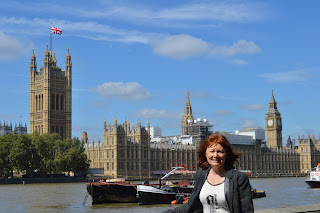 Some kilometres out of London is an ex-royal palace brimming with history and tales of notable monarchs such as Henry the Eighth. Built around 1515 by Thomas Wolsley, Archbishop and advisor to King Henry VIII it was gifted to the king in the hopes of renewing waning favour. It didn't work. Henry had him arrested and he died of natural causes before he could be executed. Hampton Court is one of only two remnants of more than 60 royal palaces and houses that were used by Henry in his day, which have survived. The second remnant being Lambeth Palace which isn't open to the public and which has little more than the gatehouse remaining.
Some kilometres out of London is an ex-royal palace brimming with history and tales of notable monarchs such as Henry the Eighth. Built around 1515 by Thomas Wolsley, Archbishop and advisor to King Henry VIII it was gifted to the king in the hopes of renewing waning favour. It didn't work. Henry had him arrested and he died of natural causes before he could be executed. Hampton Court is one of only two remnants of more than 60 royal palaces and houses that were used by Henry in his day, which have survived. The second remnant being Lambeth Palace which isn't open to the public and which has little more than the gatehouse remaining.
 It was here that Henry's only son was born and also here that his third wife Jane Seymour died after giving birth to the future Edward VI. The tudor influence has been greatly diminished by monarchs William and Mary who demolished half the Tudor palace before they died.
It was here that Henry's only son was born and also here that his third wife Jane Seymour died after giving birth to the future Edward VI. The tudor influence has been greatly diminished by monarchs William and Mary who demolished half the Tudor palace before they died. You can easily distinguish the two architectural styles; the Tudor in rose-red bricks with black markings and elaborate chimney stacks, and the Baroque in plain pink bricks with white details. Henry built a hammerbeam Great Hall which still stands today. It's wonderful to look up at the workmanship and imagine the Tudor goings-on during meal-times and events.

 After Anne Bolyn was executed the king ordered any references to her expunged but in one corner of this place they missed one and you can clearly see the initials of Henry and Anne.
After Anne Bolyn was executed the king ordered any references to her expunged but in one corner of this place they missed one and you can clearly see the initials of Henry and Anne.  There's an astrological clock that was installed during Henry's time. Incredibly it still accurately works after 500 years. It shows the time, the phases of the moon, star signs and high tide at London Bridge near the Tower of London, a key royal residence. One can marvel at the quality of ancient technology.
There's an astrological clock that was installed during Henry's time. Incredibly it still accurately works after 500 years. It shows the time, the phases of the moon, star signs and high tide at London Bridge near the Tower of London, a key royal residence. One can marvel at the quality of ancient technology. None of Henry's gardens remain but there are knot gardens outside a Tudor wing in the style. It's more of a kitchen garden really. The other garden areas are more modern and impressive.
None of Henry's gardens remain but there are knot gardens outside a Tudor wing in the style. It's more of a kitchen garden really. The other garden areas are more modern and impressive. A horticultural oddity is The Great Vine, planted in 1769. Incredibly it
still gives a good harvest of grapes which are sold at the palace. I can't vouch for the flavour though.
A horticultural oddity is The Great Vine, planted in 1769. Incredibly it
still gives a good harvest of grapes which are sold at the palace. I can't vouch for the flavour though. The day I visited there was an exhibition of beautifully crafted objects in very fine white paper. Representations of food and table decorations as well as period costumes were displayed in several rooms. They were quite exquisite and I couldn't imagine how they had been crafted. The interiors of the palace have some impressive contents but it lacks charm for its sheer size. It's easy to get lost here so allow at least 2-3 hours to explore inside and out. For more information go to http://www.hrp.org.uk/hampton-court-palace/#gs.PD9eYZc and also https://en.wikipedia.org/wiki/Hampton_Court_Palace
The day I visited there was an exhibition of beautifully crafted objects in very fine white paper. Representations of food and table decorations as well as period costumes were displayed in several rooms. They were quite exquisite and I couldn't imagine how they had been crafted. The interiors of the palace have some impressive contents but it lacks charm for its sheer size. It's easy to get lost here so allow at least 2-3 hours to explore inside and out. For more information go to http://www.hrp.org.uk/hampton-court-palace/#gs.PD9eYZc and also https://en.wikipedia.org/wiki/Hampton_Court_Palace 




















































